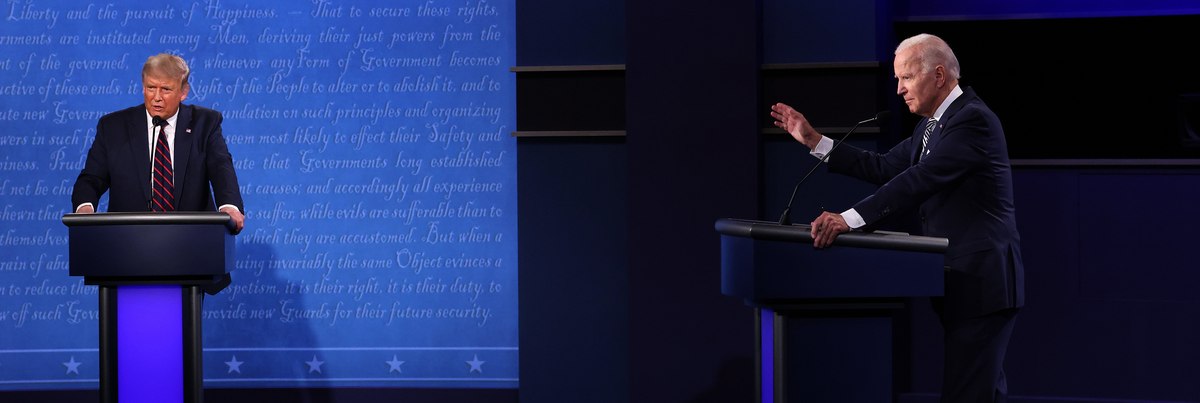With about one month to go before the 2020 presidential election, here’s a summary of what voters think of the two main candidates, according to the latest Economist/YouGov figures.
Where do the candidates fall ideologically?
Perhaps unsurprisingly, a majority (62%) of likely voters see Trump as either very conservative (26%) or conservative (36%). Just 13% see him as moderate. In contrast, 30% of likely voters think Biden is a moderate, though nearly as many view him as liberal (29%) or very liberal (28%).
Among Biden’s supporters, 51% believe he’s moderate while 36% see him as liberal (31%) or very liberal (5%). Trump supporters see their candidate as conservative (50%) or very conservative (20%).
Related: America sees Joe Biden as a moderate
Which candidate cares about people like you?
About one-third (32%) of likely voters believe that Donald Trump cares a lot about them – and an equal number say the same about his challenger. The similarities end there, however. While 20% think Biden somewhat cares about them, 12% say the same of Trump. About one in five (19%) say that Biden doesn’t care much about people like them, while 8% say Trump doesn’t care much.
Nearly half (48%) of likely voters think that Trump doesn’t care at all about the needs and problems of people like them; 27% believe Biden doesn’t care at all.
Black (69%) Americans and Hispanic (65%) Americans are especially likely to say they believe Donald Trump doesn’t care at all about people like them. Two in five (40%) white Americans say the same.
Related: How Donald Trump and Joe Biden compare among working class Americans
Which candidate is more likeable?
Joe Biden is the more likeable of the two candidates, with 44% of voters saying they either like him somewhat (18%) or a lot (26%). Only one-third (33%) say the same about Trump.
Conversely, a majority (57%) of likely voters say they either somewhat dislike (9%) Trump or dislike him a lot (48%), with just a third (34%) expressing a dislike of Biden.
Not everyone feels strongly – about one-fifth (18%) of voters say they neither like nor dislike Biden, and 10% say the same about Trump.
Unsurprisingly, supporters of both candidates tend to see their pick as generally likable. Three-quarters (74%) of Trump supporters at least somewhat like him. About four in five (79%) of Biden’s supporters feel similarly about the former vice president.
Related: The divided electorate agrees on one thing: They really don’t like the other candidate
Which candidate is a stronger leader?
On this metric, Trump edges out Biden. Overall, 51% of likely voters consider Trump to be a strong leader, compared to 46% for Biden. Trump is noticeably more likely to be described as a “very strong” leader, however, beating Biden by 34% to 21%.
Nearly nine out of 10 (88%) Democrats see Biden as a strong leader. Far fewer Independents (39%) agree, and just 5% of Republicans do.
Republicans almost universally (93%) believe Trump is a strong leader. Just over half (53%) of Independents say the same, and 14% of Democrats also consider him a strong leader.
Related: The strengths and weaknesses of the four individuals on the presidential tickets
Are the candidates trustworthy?
Even before reports broke that Trump had not paid federal income taxes for the majority of the last 15 years, voters weren’t convinced he was trustworthy. A majority (57%) of likely voters believe that Trump is not honest and trustworthy. About one-third believe he is.
Likely voters are closely split on Biden: 45% believe he is honest and trustworthy, 41% believe he isn’t.
As with many of these topics, the supporters of each candidate generally have a favorable view of their preferred person. Most of Trump’s supporters (76%) believe that he is honest and trustworthy, and most of Biden’s supporters (85%) believe that he is.
Related: When it comes to Trump and Biden, honesty can mean different things
See the toplines and crosstabs from this week’s Economist/YouGov Poll
Methodology: The Economist survey was conducted by YouGov using a nationally representative sample of 1,500 registered voters interviewed online between September 27 – 30, 2020. This sample was weighted according to gender, age, race, and education based on the American Community Survey, conducted by the US Bureau of the Census, as well as 2016 Presidential vote, registration status, geographic region, and news interest. Respondents were selected from YouGov’s opt-in panel to be representative of all US citizens. The margin of error is approximately 3.8% for the overall sample.








